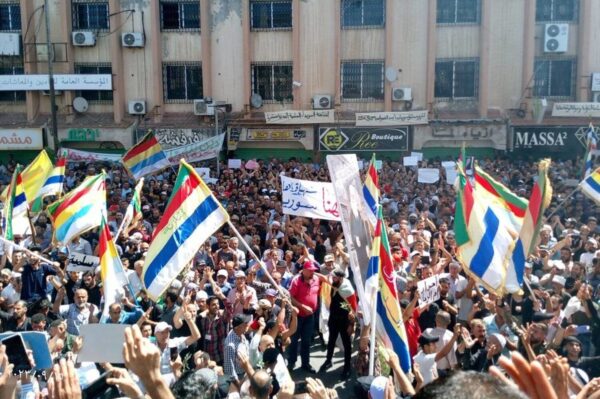The anti-regime protests have continued in Syria’s Sweida amid reports that an American congressman contacted the spiritual head of the country’s Druze community to discuss the rallies.
News spread on social media on Saturday that Congressman French Hill had contacted Sheikh Hikmat al-Hajri. They spoke by telephone for over half an hour.
Hill reportedly inquired about “what was really happening in Sweida” and the overall situation in the southern province in the wake of news that the protesters in front of the Baath party branch in Sweida city were fired at.
Syrian opposition figure Maher Sharafeddine said Hill expressed his pride in contacting Hajri, hoping to develop relations further with him.
Hill did not disclose information about his reported talks with Hajri and the latter did not issue any statement to confirm them either.
Three people were wounded on Wednesday when bullets were sprayed at anti-government protesters in Sweida, activists and local journalists said, in the first reported use of violence in weeks-long demonstrations there.
Activists, who have been taking to the streets to call for President Bashar al-Assad to step down over worsening living conditions, accused members of the ruling Baath party of firing.
Hajri has been the target of a fierce campaign by the regime and Iran loyalists after he accused Iran of “occupying” Syria and calling for “jihad” against it.
In an open letter to Hajri, MP Khaled Abboud, a close ally of Assad said that should the reports about his and Hill’s talks be true, then “it is evident who is behind the protest movement” and “this puts us in confrontation with it.”
On Friday, the US embassy in Damascus said Washington was concerned over reports that the Syrian regime was quelling the Sweida rallies.
Washington supports the right of the Syrian people to peaceful protests in their pursuit of a dignified life, freedom, security, and justice.
It added that the political solution, based on United Nations Security Council 2254, was the sole way to resolve the conflict in Syria.
Conflict erupted in Syria in 2011 with rallies against Assad in the country’s south and quickly morphed into an all-out war that has left hundreds of thousands dead and displaced millions.
Assad recaptured most of the country with help from his allies Russia, Iran, and its proxies. Even with frontlines calmer, the country’s economy remains in tatters and its humanitarian needs have skyrocketed.
Still, open criticism of the government was extremely rare in Assad-held areas until the government’s decision to lift fuel subsidies last month prompted fresh protests concentrated in Sweida.
Hajri, on Wednesday, blamed “corrupt” security forces for the incident, which he said would not deter protests.
“The main thing is restraint, and we won’t give up on our peaceful demands. The street is with us. … (We will stay) a day or two or a month or years,” Hajri said.
Asharq A Awsat


Leave a Reply
You must be logged in to post a comment.